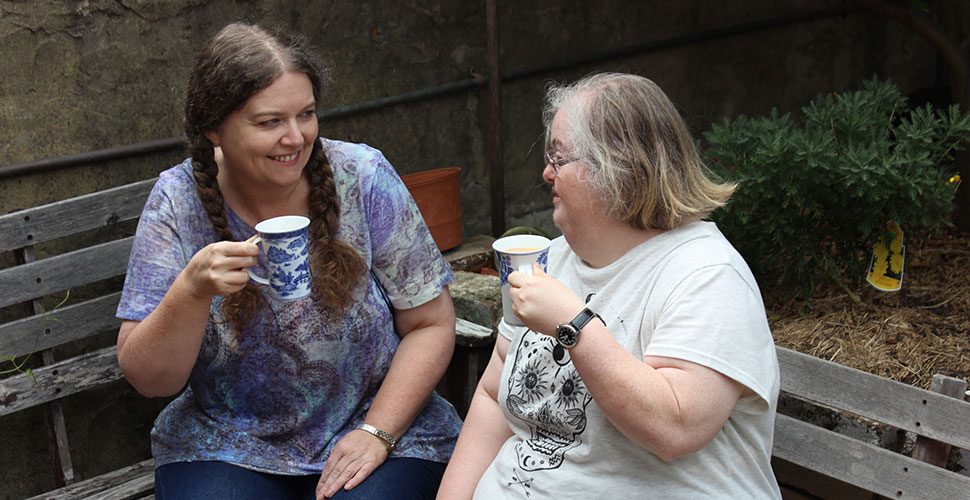Tea for two – our journeys

In 2016 for the first time, Meredith was able to invite me and my boys to her place for Christmas lunch. She is 49 years old and until 2016 had lived with our parents.
Christmas day was special for us because not only did we have a great day together, we were both in a position to choose what we wanted to do and who we wanted to spend the day with. The NDIS is helping both of us live more satisfying and meaningful lives. In 2015 I was in hospital for Christmas, and though I had received an NDIS plan two years earlier, my life had not improved. In fact everything seemed to have fallen apart. Many people talk about the limitations of the NDIS, but in my case, the limiting factors were human and systemic.
For example, when I asked my planner for flexibility to receive supports at night, she emailed to someone else stating “… I’m not giving her money to have someone keep her company of a night.” The fact that she thought it was her money to ‘give’, denied my right to have flexible supports. That she didn’t even email her answer to me, illustrates how her limitations were imposed on me. I then found out the limitations of the complaints processes as it took months to get a planner who was responsive and enabling. My attempts to gain supports were hampered by service delivery models and NGOs who had no capacity to take on someone as ‘complex’ as me. I had workers who threw up their hands and told me ‘that’s not my job’ when asked for help to navigate a website or who were intimidated by my abilities at work as an arts facilitator and could not understand their role in my life. In an extreme incident, my request for new, unhelpful staff to leave my workplace was met with a call for the police and an ambulance.
This fight to use my funding and subsequent failure led to multiple hospitalisations and trauma in the extremely limited Mental Health sector. The Disability sector’s limited understanding of mental illness and trauma awareness left me as marginalised and vulnerable as before the NDIS.
During this time I saw Meredith during our shared arts activities as part of Open Cage Ensemble. I was trying to run this inclusive arts business, juggle hospital and services’ dysfunction and attempt to be a good mother. I was failing at everything.
I was not included in her NDIS process. My parents managed that with my more ‘appropriate’ sister. Her transition out of home, into shared accommodation was organised through a service who did a good job.
She moved in and began attending a day centre twice a week, going out with carers and her housemate, having one on one time with a really great worker and loving life. Meredith learnt how to use an ATM, shopped and has begun to manage money, started to learn to cook, wash clothes, operate a dishwasher and got so busy for the first time in her life she had to learn to choose between conflicting events.
There are limitations with this service model too. As Meredith becomes more aware of what she wants and more confident in communicating her needs those limitations will need to be challenged, but for now Meredith is happy, engaged and challenging herself every day within the model chosen for her.
One of the first things she used her support to do, was come to my place and organise to meet me for coffee. I was in bed, agoraphobic and depressed. We have both come a long way since then. The introduction of a wonderful Specialist Coordinator of Supports a year ago is now enabling me to negotiate appropriate care and begin to change all areas of my dysfunctional life.
Like everybody, Meredith and I have our own limitations. Some are functional and related to our disabilities, but others are there because they haven’t been challenged. Meredith is learning to speak up about what she wants. I’m discovering how to recognise what I want and more importantly, to listen to myself about things that are not working. Living a limited life for years creates more limitations that need to be noticed and addressed.
Out of the devastation of the first 2 years of my NDIS journey, hope and a sense of excitement for the future has replaced hopelessness and resignation that ‘this is just how life is.’ Now I’m thinking about how my life could be. I’m experiencing how having the right supports in place can make a difference.
Having a real relationship with my sister is now part of my more ‘normal’ life.


Join the conversation